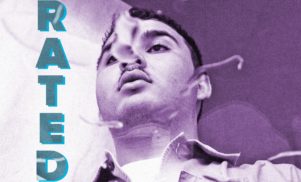FACT Rated is our series digging into the sounds and stories of the most vital breaking artists around right now. This week Lewis Gordon speaks to Mechatok, the Berlin producer deconstructing pop music for Lorenzo Senni’s Presto!? imprint.
Before becoming Berlin producer Mechatok, Timur Tokdemir had a different idea of who he was going to be when he grew up. He had sketched out a life involving concert halls and the grueling practice schedule of a performing classical guitarist. “I took it really seriously until I was 18 but I kind of pulled out last minute,” he says, somewhat relieved. “Just the outlook you have if you’re a classical guitarist is pretty depressing.” Tokdemir is still only 21 but over the last few years has slowly developed one of the most distinctive sounds in contemporary electronic music: equal parts blissful and melancholic club-ready pop miniatures. Finding homes with both the Stockholm-based Staycore Collective and London’s Bala Club, his productions are often feather-light and hyper-melodic unlike the more percussive, confrontational offerings of his peers.
Tokdemir began producing electronic music as a teen living on the outskirts of Munich, describing the area with little enthusiasm: “It’s the last stop on the train and it’s really suburban—not exactly super rough but not super pretty either—just this kind of generic, bland place.” He met Bao-Tran Tran, aka Mobilegirl, at school when he was 14 or 15 and the pair immediately began hanging out, usually just messing around on the computer. Tokdemir mentions one party run by a friend who would book artists such as Why Be and Lotic but these only came around every six months or so in an otherwise lacking scene. Then, at age 18, he upped sticks and made the five-hour journey north to Berlin to study graphic design.
The Gulf Area EP, released in December 2015 on Munich-based label, Public Possession, marks the self-described end of Tokdemir’s “Munich episode” but also the point at which his sound began to coalesce. Across half of the EP, Tokdemir explored ominous mechanized club music but ‘U.D.G’ and ‘L.O.S.S.’, both featuring heavy use of a midi harp, pointed towards a more plaintive, bittersweet sound. ‘Nite Dew’, released around the same time on the Psychotropia compilation for The Astral Plane, took the approach further, honing his pop sensibilities into a computerized, music-box lullaby.
“That‘s kind of the tipping point where I started feeling comfortable having a voice. It didn’t seem like I was just mimicking something,” Tokdemir says, before reflecting on his early years spent aping the electro, blog house of Justice. “It’s a confidence thing as well. I’d moved out and kind of felt like I was doing my own thing.” He arrived in Berlin just as Janus, the collective including M.E.S.H. and KABALAM, were enabling diverse sounds to challenge the city’s homogenous techno-centrism. Now he lives in south Berlin in Neukölln, socializing with a large extended group of fellow DJs, producers and artists.
Since the move, Tokdemir’s songs have only grown more assured. See Thru, released on Staycore in October 2016, expanded the space and minimalism of his palette; the title track, in particular, operates as a glorious, wordless anthem. His latest EP, set for release on Lorenzo Senni’s imprint Presto!? this month, moves his crystalline melodies into a micro-tone pointillist realm, albeit with a propulsion not seen in his earlier work. Across its four tracks, Tokdemir doesn’t so much deconstruct pop music as distill it to its core elements.
“I don’t like how maximalism is such a common thing — it seems like pop is carrying around this massive load of unnecessary material,” Tokdemir says. “There’s this one Taylor Swift song that is a really good example. It builds up and it’s terrible but then it drops into this thing where there’s only a bassline and her singing on top. Those 16 bars, to me, should have been the hook or the main part. It’s catchy, it conveys loads of emotion. You feel uplifted but melancholic at the same time, like all those things that pop is fun for. But did they really have to feel like they had to put in a trap-metal hybrid thing afterwards.”
He’s already flexed these burgeoning compositional chops on collaborations with Uli K and Yung Lean. Last June, he flew out to New York to work with Palmistry for six weeks, not just with the vocalist and producer but songwriting for major-label pop artists. “That time was definitely surreal,” Tokdemir says. “The whole thing of going into sessions and being in the studio is all very theatrical. It creates exclusivity and these spaces that only certain people can get into. Because at the end of the day, most of the exchange happens in fucking emails, you know. And studio sessions are basically for you to talk about things, play things and create a certain atmosphere.”
DJ Mustard is one artist Tokdemir looks up to in the mainstream, taking heart from the LA rap producer’s idiosyncratic and unfussy style. “For me, he’s an exceptional artist. I kind of collect all of his songs,” Tokdemir says. “What he makes is not this highly constructed thing where loads of people are trying to contribute to a huge collage. It’s such an impactful, punchy way of making a song.”
Lewis Gordon is a freelancer writer. Find him on Twitter.
Read next: Lorenzo Senni is the Warp rave voyeur reaching for euphoria on Persona





























